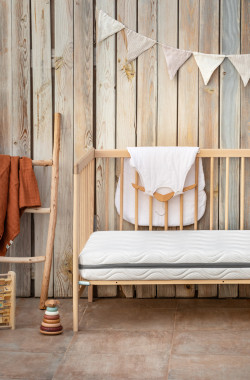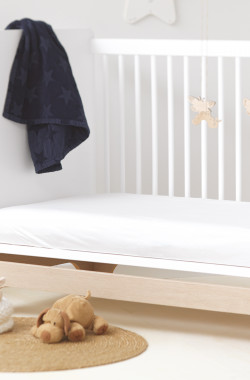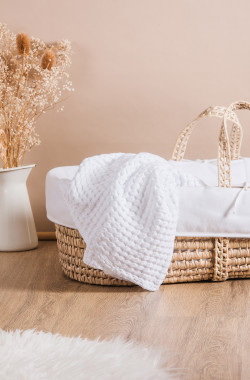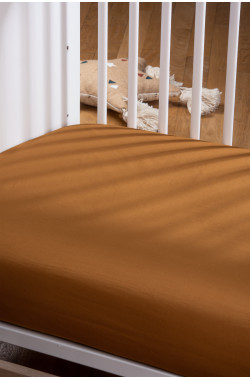
What are the toxins in foam mattresses? | Answers
Slipping into clean, fresh sheets is a real treat! Don't you think?
On the other hand, wrinkled or stained sheets can affect the quality of your (and your mini's) sleep.
In addition to sleep quality, unknown substances in certain mattresses or bedding can cause serious damage to your family's health.
What chemicals are in our bedding?
Our bedding is often impregnated with chemicals that are supposed to make our lives easier and protect our health, but prolonged contact with them can be dangerous for our little ones' fragile organisms. Fungicides and insecticides in mattresses, comforters, pillows and bedding are among the most worrisome substances, as they are supposed to prevent the development of mold, dust mites and bacteria that thrive in warm and humid conditions.
Formaldehyde is also used in some textiles to prevent wrinkling and maintain shape.
Foam and innerspring mattresses often contain chromium, brominated flame retardants, perfluorinated compounds, and triclosan, which fight dust mites, bacteria, odors, and stains. However, these chemicals can be harmful to human health because they contain neurotoxic and carcinogenic substances, endocrine disruptors (which can affect children's growth, hormone development, and fertility), and mutagenic substances.
Using a mattress protector can help limit exposure to these substances. A breathable polyurethane mattress protector is preferable to a PVC mattress protector, which contains phthalates.
Long-term exposure to these chemicals can cause respiratory and sleep problems, as well as genetic mutations and hormone disruption. It is therefore important to take steps to reduce our exposure to these chemicals.
Choose mattresses and bedding made from natural materials
It is also recommended to choose bedding made of natural fibers such as organic cotton, linen, silk or hemp, which are less harmful to health and more environmentally friendly. In addition, these natural fibers have properties that regulate body temperature, providing optimal sleeping comfort.
Finally, to avoid exposure to the harmful substances contained in synthetic bedding, it is recommended that bedding be washed before first use, preferably with a natural and chemical-free detergent. It is also recommended to change your bedding regularly to limit the accumulation of toxic microparticles.
When choosing a mattress, it is essential to read the composition carefully and even if the list of harmful substances is not displayed, it is important to check that the mattress has not undergone any chemical treatment: neither insecticide treatment, nor antibacterial, nor anti-mould, nor fire treatment.
In short, choosing a natural mattress and sheets is an important step in preserving the health of your baby and the environment.
Kadolis' advice: We advise you to air out your room and that of your minis every day. This will prevent the proliferation of dust mites, refresh the air and remove any moisture that may be present in the room.
We also recommend that you regularly wash your bedding at a high temperature using natural detergents such as white vinegar or baking soda, which will disinfect and eliminate odors while preserving the quality of the textiles.
Finally, for hygienic and safety reasons, we recommend buying a new mattress for the arrival of a newborn. Used mattresses can be contaminated with dust mites, fleas, bed bugs, etc.

















